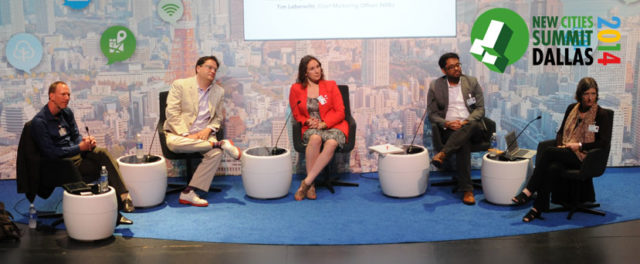Urban Wellness, Happiness and Purpose
October 6, 2014 — Blog
Are wellness, happiness and purpose changing the way we live?
Tim Leberecht was the moderator of the panel Next Generation Concepts On the Contemporary City: Wellness, Happiness and Purpose at the NewCities Summit 2014 and opened the discussion by quoting Aristotle: “People gather in cities first and foremost for security, then for economic opportunity, and then they stay for the good life.” Is this rationale still true? Over 50% of the population is already under 30 and, by 2030, about 75% of the workforce is predicted to belong to the millennial generation.

Sonja Miokovic invited people to think about the distinction between ‘youth’ and ‘youthful’. The former word describes a demographic challenge, unemployment and many other dark realities. The latter denotes vibrancy, dynamism, energy and colors. Some of the best cities around the world possess youthful attributes, she said, and the millennials are the ones defining what those attributes are – diversity, public transportation, and the ability and access to use the city among others.
Despite having to face challenging economic conditions, the millennial generation is full of optimism
Despite having to face challenging economic conditions, the millennial generation is full of optimism. Millennials want something different, more meaningful: purpose. Aaron Hurst, author of a book called ‘The Purpose Economy’, went as far as proclaiming that we are at the dawn of “a new age of purpose”. Purpose, according to Hurst, boils down to: 1) a need for relationships, 2) a need to do something greater than yourself, and 3) a need for personal growth. As he stated, the millennial generation is helping make purpose central to our society.
Sarah Murray, an avid observer of these optimistic stories, invited the panelists to consider the other side of the coin. She reminded the panelists of the large amount of the population that has been jobless for a long time and that does not have access to technologies. Is the age of optimism the same one that gave birth to the London riots in 2011? Is ‘purpose’ part of this trend? Does this behavior not stem from something else, a desire for engagement, for example?
Even at the bottom of the pyramid, creativity, design, and hacking play a key role and propel a society forward – Ahmed Riaz
Developing this thought, Ahmed Riaz explained that the reason people are interested in purpose is because it is related to the act of creativity, which in turn leads to a feeling of hope, and an ability to control external factors. In that sense, purpose is the momentum, the thing that cycles people up. Even at the bottom of the pyramid, creativity, design, and hacking play a key role and propel a society forward.
The drive towards the purpose model is underlined by a few key principles, such as empathy and creativity. However, as the panelists and audience discussed, the education system is not designed to build empathy in students. On the contrary, they argued, schools tend to isolate youths from the community.
Questions from the audience prompted the panelists to further discuss issues related to technology and citizenship, as well as creativity and sharing as a measure of a city’s success.
Speakers
- Aaron Hurst, Author and Founder, Taproot Foundation – @Aaron_Hurst
- Sonja Miokovic, Global Director, Youthful Cities – @ajnosreverse – @youthfulcities
- Ahmed Riaz, Principal – Design, frog – @ahmedriaz – @frogdesign
- Sarah Murray, Author and Journalist, The Economist and The Financial Times – @seremony
Moderator: Tim Leberecht, Chief Marketing Officer, NBBJ – @timleberecht – @NBBJDesign
